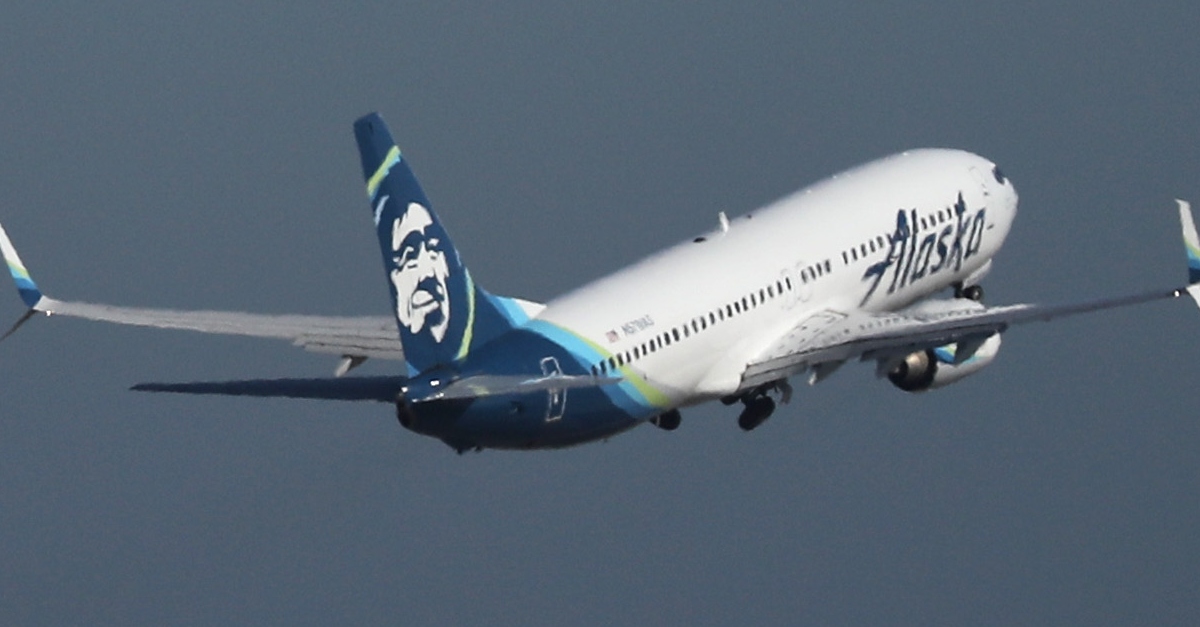
Unrelated Alaska Airlines flight taking off from San Francisco (Justin-Sullivan/Getty)
An Alaska Airlines flight attendant has filed a human rights complaint against the company, alleging that its uniform and presentation requirements discriminate against nonbinary and gender-fluid employees.
Justin Wetherell, a flight attendant and flight attendant instructor who has been with the Washington-based airline since 2015, says that the company’s uniform and grooming standards are discriminatory against those who are nonbinary and gender fluid. Wetherell, who uses the pronouns they, them, and their, is nonbinary, meaning a gender identity that is neither exclusively male nor female.
“Justin’s gender expression is fluid, meaning that Justin’s external manifestations of gender are not exclusively masculine or feminine,” the complaint explains. “Consistent with their gender identity and gender expression, Justin dresses and grooms in a manner that is not associated with traditional, rigid male or female dress or grooming standards. For example, Justin maintains facial hair, has long hair, wears makeup, and dresses in a manner not typical of the gender binary.”
The Washington Law Against Discrimination (WLAD) prohibits discrimination against employees based on their sexual orientation, which includes “gender expression or identity.”
Alaska Airlines requires employees in customer-facing positions, including flight attendants, to “dress and groom according to the standards of [the airline’s] uniform policy.” Flight attendants such as Wetherell must wear items indicated in uniform kits designated as either “masculine” or “feminine” and must follow requirements regarding presentation of hair, jewelry, and makeup.
“[Alaska Airlines’] uniform policies contain standards for all aspects of a flight attendant’s appearance, including clothing, hair, grooming, cosmetics, jewelry, and shoes,” the complaint said, noting that when Wetherell is working as a flight attendant instructor, they are only required to “dress and groom in a professional manner” but do not need to adhere to the company’s uniform requirements.
Uniform kits at Alaska Airlines were traditionally designated as “male” or “female” and each “look” had a companion set of “grooming” rules, according to the complaint. Employees wearing the “male” look, for example, were required to pull their hair back if it was longer than shoulder-length, and those wearing the “female” look were allowed to wear a much broader spectrum of makeup than those wearing a “male” uniform.
Wetherell had requested some accommodations, such as being able to wear heels in accordance with “female” uniform standards and to wear components of both the “male” and “female” uniforms at the same time. The company denied these requests, saying that the uniform and grooming requirements are a “critical component of [Alaska Airlines’] brand, especially for customer facing employees such as flight attendants.”
As of March 2022, company policy allowed customer-facing employees to have more tattoos, more hair style options, additional earrings and piercings, and to wear fingernail polish and makeup than previously permitted. Certain restrictions remained, however: employees could only wear red, bright pink, or berry colored lipstick or lip gloss only if they were wearing the “feminine” look, and facial hair was allowed only with the “masculine” look.
Employees are still required to wear uniforms from either the “masculine” or “feminine” uniform kit, and cannot not combine elements of both.
As a result, the complaint says, despite the changes to Alaska Airlines’ policy, Wetherell is still limited in their ability to dress in accordance with their gender identity and gender expression.
“This has resulted in Justin being frequently misgendered at work by both co-workers and customers, exacerbated Justin’s stress, anxiety, depression, and insomnia, and caused Justin to frequently avoid working as a flight attendant in favor of working as a flight attendant instructor so that they can dress and groom in a manner consistent with their gender identity and gender expression,” the complaint says. “Justin has experienced panic attacks leading up to shifts when they were scheduled to work as a flight attendant. These panic attacks resulted in Justin trading out of shifts or calling out sick multiple times.”
Whetherell is seeking an order determining that Alaska Airlines has engaged in unlawful discriminatory conduct. The complaint is seeking an undetermined amount of damages for Wetherell and any other Alaska Airlines employees living in Washington “who have been harmed by [Alaska Airlines’] discriminatory conduct related to its uniform policy. Wetherell also wants the airline to require employees in supervisory or managerial positions to attend gender identity and gender expression discrimination training approved by Washington’s Human Rights Commission.
Wetherell is also requesting that the airline “be enjoined from discriminating against non binary employees based on their gender identity and gender expression, and should be required to change their policies and procedures to comply with this injunction.”
Wetherell, represented by the American Civil Liberties Union of Washington, had filed a complaint with the Washington Human Rights Commission in 2020, according to a press release Tuesday.
According to the ACLU, the commission “uncovered evidence to support Justin’s claims that they were ‘subjected to the adverse employment action of being required to dress and groom in a manner that is not consistent with their gender identity and gender expression.'”
That investigation concluded that “[a] preponderance of the evidence supports a finding that [Justin] was discriminated against in employment on the basis of gender identity and gender expression[,]” the ACLU’s press release said, adding that Alaska Airlines continues to maintain the same policy.
“I hope the filing from the state of Washington will push Alaska Airlines to finally fix their discriminatory and illegal uniform policy,” Wetherell said in the ACLU press release. “I look forward to a resolution of my three-year struggle to have my gender identity and expression respected by my employer.”
Representatives for Washington Attorney General Bob Ferguson and Alaska Airlines did not immediately respond to Law&Crime’s requests for comments.
Read the complaint here.
Have a tip we should know? [email protected]